Soccer newsletter: Soccer world rebukes Russia over Ukraine invasion
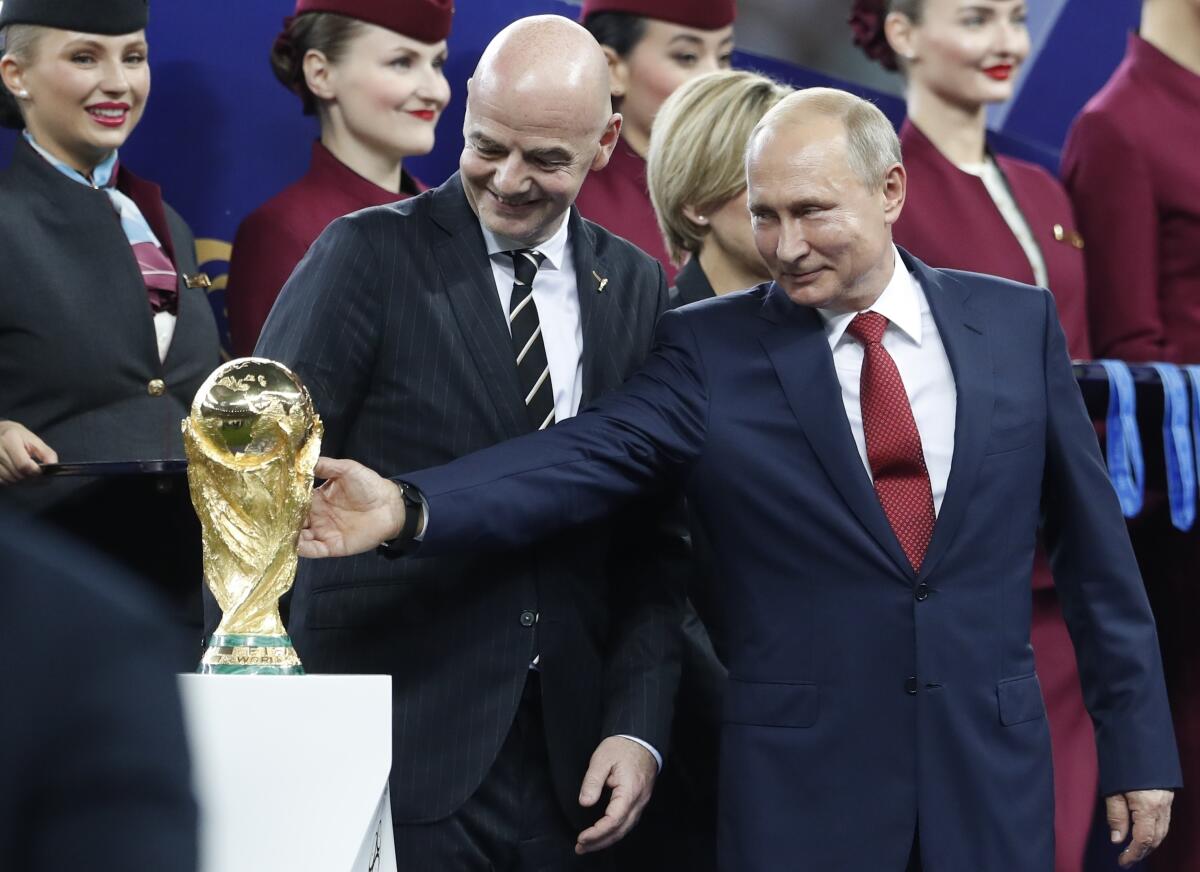
- Share via
Hello and welcome to the weekly L.A. Times soccer newsletter. I’m Kevin Baxter, the Times’ soccer writer. We’ll get to all the predictable stuff — the opening weekend in MLS, the women’s national team breaking out of its goal drought and Jesse Marsch’s new job in England — in a moment. But we must start in Ukraine, where Russia’s invasion has underscored the importance and impotence of international sport.
Nobody likes to play games with bullies and cheats. Russia is both. If we didn’t know it before, or didn’t acknowledge it before, that conclusion now is unavoidable.
First came the soap opera surrounding 15-year-old Russian figure skater Kamila Valieva, who tested positive for a banned substance last year but still was allowed to take part in the Beijing Olympics.
That a Russian athlete should be caught doping is no longer news. The country has been stripped of 46 Olympic medals and, since 2017, been suspended from competing at the Summer and Winter Olympics Games because of a state-sponsored doping scandal. The Russian Paralympic Committee was banned from the Games a year earlier.
(Russian athletes have been allowed to compete under the banner of the Russian Olympic Committee and they can’t fly the flag or play the anthem during medal ceremonies.)
But if the feckless leaders of the IOC and FIFA have long stood as shining examples of spinelessness and accommodation when it comes to Russia, the invasion of Ukraine has forced them to change direction. Not surprisingly, they were forced to do so by the athletes, coaches and fans they are supposed to represent.
Enjoying this newsletter? Consider subscribing to the Los Angeles Times
Your support helps us deliver the news that matters most. Become a subscriber.
On Monday FIFA, the world governing body for soccer, and UEFA, which oversees the sport in Europe, announced Russian national and club teams have been banned from all competitions “until further notice.” Russia had been scheduled to take part in World Cup qualifying playoffs in three weeks while its women’s team has qualified for this summer’s European championships.
The announcement also removes Spartak Moscow from the second-tier Europa League club tournament, where it was scheduled to play Germany’s Leipzig in a two-leg playoff beginning March 10. Leipzig now advances directly to the quarterfinals.
The actions further isolate a country that already has been hit with widespread sanctions involving international banking, travel and trade since its president, Vladimir Putin, ordered the attack on Ukraine last week. From a sports perspective it’s nearly unprecedented in scope and goes beyond the ban that kept Yugoslavia out of the 1992 European Championships and qualifying for the 1994 World Cup.

But before we give FIFA and UEFA too much credit, remember both organizations only recently had agreed to let Russia bask in their brightest spotlights. FIFA staged the last World Cup in Russia, which rewarded it when Putin presented FIFA president Gianni Infantino with a special “friendship” medal. And UEFA had planned to play its Champions League final in St. Petersburg in May before announcing last Friday the game would be moved to Paris.
As for Monday’s actions, neither body really had much choice. During the weekend Poland, Sweden and the Czech Republic forced the issue by declaring they would not play Russia, possibly forfeiting a World Cup berth since they’re all matched in the same four-team playoff pool with Russia.
“I can’t imagine playing a match with the Russian national team in a situation when armed aggression in Ukraine continues,” Polish star Robert Lewandowski said. “Russian footballers and fans are not responsible for this, but we can’t pretend that nothing is happening.”
If FIFA had not acted, it ran the risk of seeing Russia advance to Qatar as a pariah, where it would take part in the world’s largest sporting event while three other teams sat home for acting on the principles of sportsmanship and fair play FIFA pretends to honor.
By mid-morning Monday the soccer federations in the U.S., Ireland, England and Wales had joined in by announcing they would not play Russia as long as it remains in Ukraine.
Meanwhile, the IOC is calling for Russian and Belarussian athletes in all sports to be prevented from competing in any international competition.
“In order to protect the integrity of global sports competitions and for the safety of all the participants, the IOC executive board recommends that international sports federations and sports event organizers not invite or allow the participation of Russian and Belarusian athletes and officials in international competitions,” the committee said in a statement.
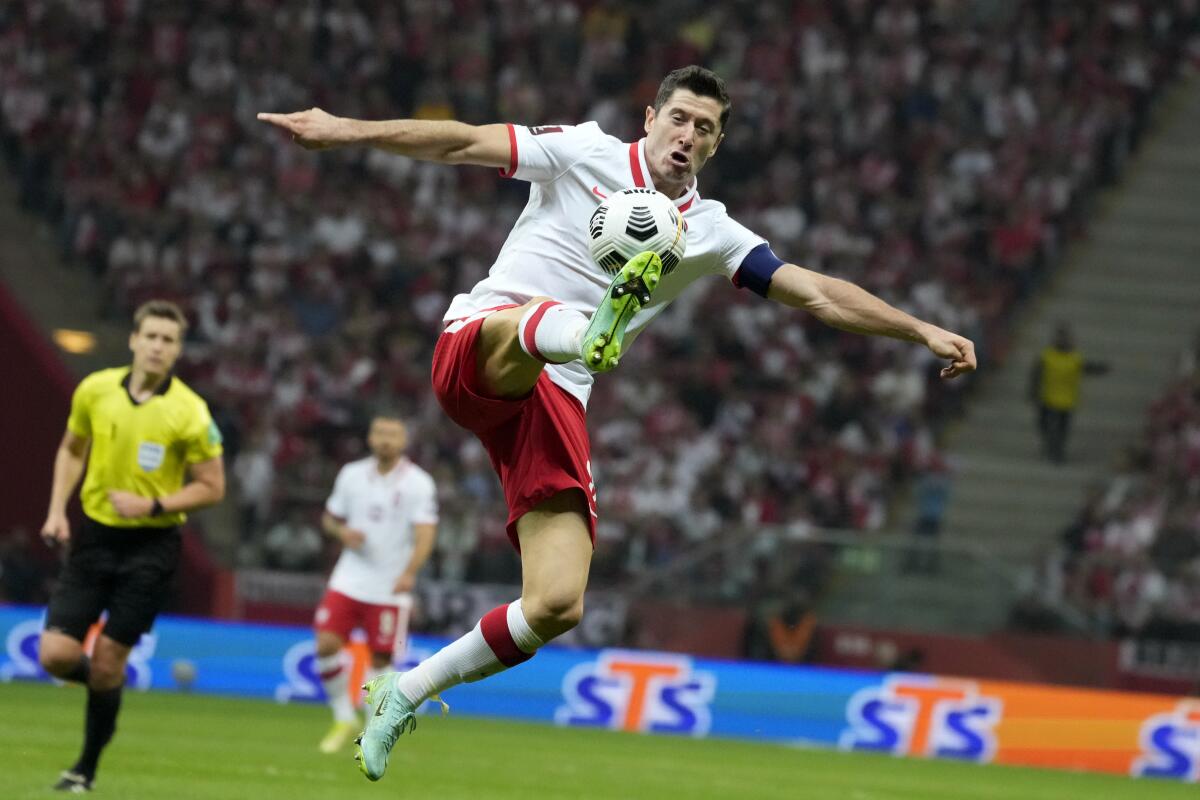
The declaration immediately was exposed as toothless though since Russian and Belarusian athletes made be allowed to compete as long as they don’t do so under their countries flags. Whether Russian and Belarusian athletes will be allowed to compete in the upcoming Winter Paralympics, which begin Friday in Beijing, could be decided Wednesday.,
Let’s see if anyone shows up to compete against them.
But if the actions of FIFA, UEFA and the IOC can be chalked up to public pressure and not sincere outrage, there is no doubt much of the rest of the international sports community mirrored Lewandowski and his Polish teammates, who were willing to make sacrifices for principle.
Second-division German soccer club Schalke removed the logo of Gazprom, the Russian energy giant, from the front of its jersey while England’s Manchester United canceled a sponsorship deal with Aeroflot, Russia’s state airline.
Formula One pulled September’s Russian Grand Prix from the Black Sea resort of Sochi, where Putin has a home, after four-time champion Sebastian Vettel said he would boycott the race. The North Carolina-based Haas F1 Team followed by canceling its sponsorship deal with Russian fertilizer company Uralkali and instead will race in a plain, white paint scheme during preseason testing in Spain.
The International Ski Federation said it will not allow any of its remaining World Cup events to be held in Russia. The European curling championship, scheduled for November, also will be relocated and the International Tennis Federation has canceled all events in Russia.
The International Chess Federation is taking its summer Chess Olympiad out of Moscow. International water polo and artistic swimming events are being rescheduled. Even MLS noticed, with the Galaxy and LAFC holding moments of silence for the people of Ukraine while displaying the country’s blue-and-yellow flag on the scoreboard before their season openers.
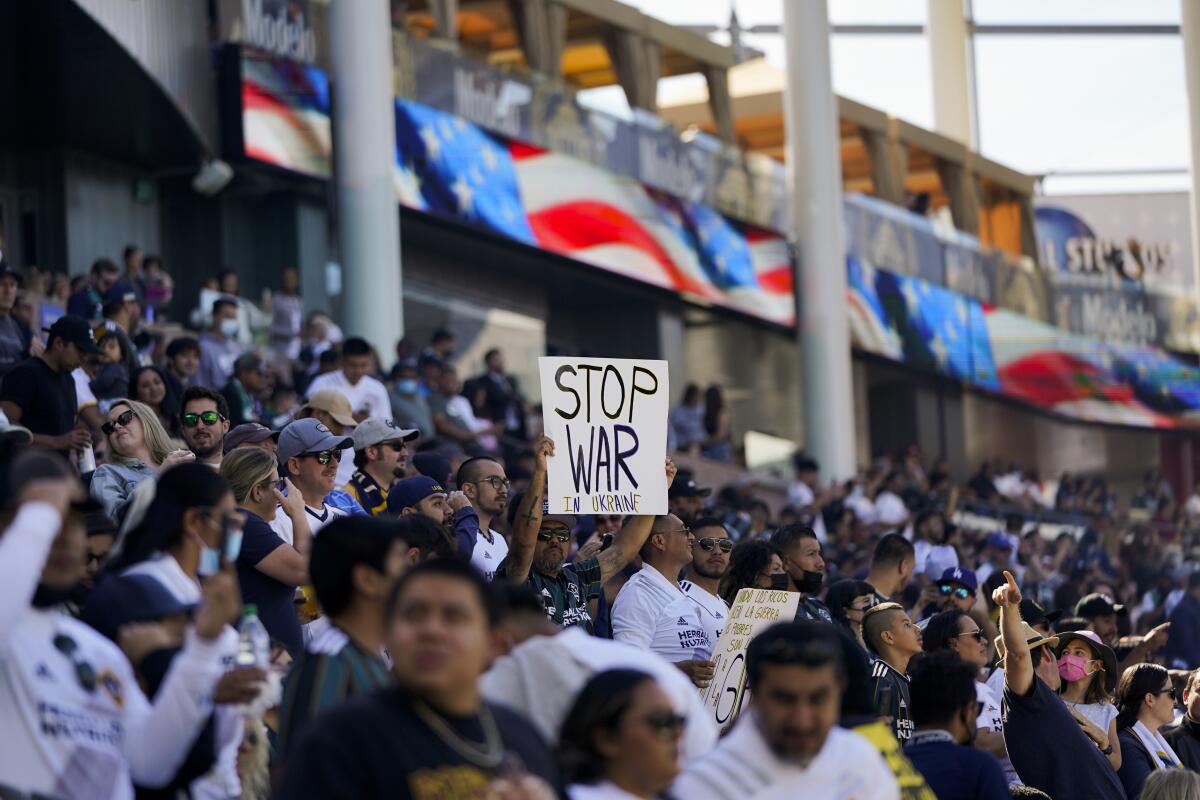
After the Galaxy game, new acquisition Douglas Costa, who played six seasons in Ukraine, carried a Ukrainian flag around the field. But perhaps the most touching moment on a soccer field this weekend came in Lisbon, where Benfica subbed on Ukrainian forward Roman Yaremchuk in the 61st minute of a 3-0 win over Guimaraes.
Even before the change was announced, the crowd of 39,846 rose to its feet, some waving signs or Ukrainian flags. Teammate Darwin Núñez then handed Yaremchuk the white captain’s armband and as the game paused briefly to allow the cheering to continue, Yaremchuk began to cry. Here’s the video, which has gone viral.
These moves aren’t only symbolic and moving, though. For Russia they could be costly. Pulling the Champions League final and Russian GP out of the country, for example, will cost the two host cities tens of millions of dollars in addition to the loss of immeasurable prestige and visibility of staging the events.
Which isn’t to say symbolism and international solidarity doesn’t matter. It does because in the international arena sports mean something. Why else would countries spend billions to put on events like World Cups and Olympic Games? Why else would Russia risk scorn, censure and ostracism over a decades-long illegal doping program?
Russia’s place on the UN Security Council guarantees it never will face meaningful punishment there. But the international sporting community and its alphabet-soup organizations — UEFA, FIFA, IOC, FIS, ITF — have united to put the country in a temporary sports timeout. And for an ambitious country that wants to be a player on the world stage, that means something.
Not enough to stop a war. But enough to leave a mark.
Vela, Chicharito playing as if their futures depend on it
No one knows how much longer Carlos Vela and Javier “Chicharito” Hernández, the two best-paid players in MLS, will continue to get paid by MLS. Vela’s contract, which had paid him $6.3 million in 2021, expires in June while Hernández is in the final season of a three-year $18 million contract.
But on the opening weekend of the 2022 season they made compelling arguments that they deserve to stay, with Vela scoring three times in a 3-0 win over the defending Western Conference champion Colorado Rapids and Hernández’s goal in the 90th minute beating New York City FC, the reigning league champion, 1-0.
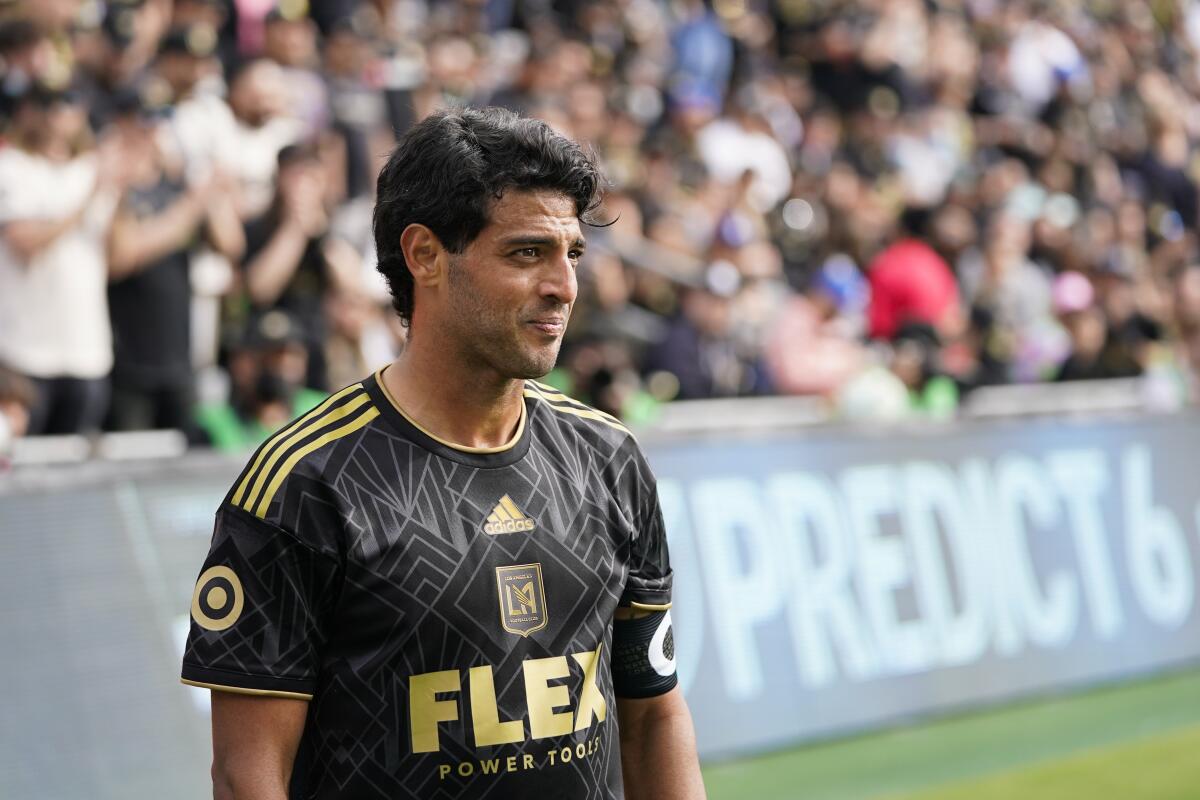
Clouding their futures is that fact both are on the wrong side of 30 — Vela turned 33 on Tuesday while Hernández turns 34 in three months — and are coming off two consecutive injury-plagued seasons.
Vela missed more games than he played in the last two seasons — and seemed disinterested in many of the others. So LAFC general manager John Thorrington is right in waiting for Vela to prove his form and fitness before offering a new deal.
“It’s not in my hands,” Vela said last week. “I’m waiting for the offer from the club.”
Waiting too long could work against LAFC. Vela has talked repeatedly about wanting to return to Europe, where he played for 13 seasons before coming to LAFC for its inaugural campaign in 2018. If he continues to play as he did in Saturday’s season opener, he could start drawing interest from teams on the continent, which could drive his price beyond what LAFC would be willing to pay.
But if continues to play the way he did in Saturday’s opener, it will make it much harder for LAFC to let him go as well.
Vela coyly appeared content to play that game last week by talking up his love for the club and its fans but adding the decision over whether or not he stays isn’t his alone.
“I love to play in L.A. I love to play in the Banc with our fans,” he said. “I think they love me. They show me that every time I step on the field.
“I know it’s a business and we will move forward. So it’s nothing to be worried about. If we’re going in the same direction, yeah, I’m more than happy to be here. But if not, no problem.”
There are several other factors that could cloud that process. When Diego Rossi’s transfer to Turkish club Fenerbahçe is completed, it will open a designated-player spot and allow Thorrington to sign a cheaper, younger alternative to Vela, something LAFC arguably already has in 26-year-old Colombian striker Cristian Arango, who scored 14 times in 17 games after joining the team last August.
Under new coach Steve Cherundolo the team also has changed its playing style. In LAFC’s first four seasons under Bob Bradley, the team played a breathless, possession-based game that was perfectly suited to Vela’s talents. In its first game under Cherundolo, LAFC was cautious in the attack with Vela’s three goals coming on two breakaways and a penalty kick.
Then there’s Vela’s wife Saioa Cañibano, whom he met while playing in Europe. She reportedly misses Spain and would like to return there. That’s a lot to consider. For the time being, however, Vela appears content to let things play out.
“I will work hard to do my best in … the four months or five months I have left in my contract,” he said. “Who knows where I can be in six months? So I live in the present.
“I want to enjoy it. I want to do my best for my teammates, for the fans, for my family. And after that, we’ll see. I don’t even know where I will be.”
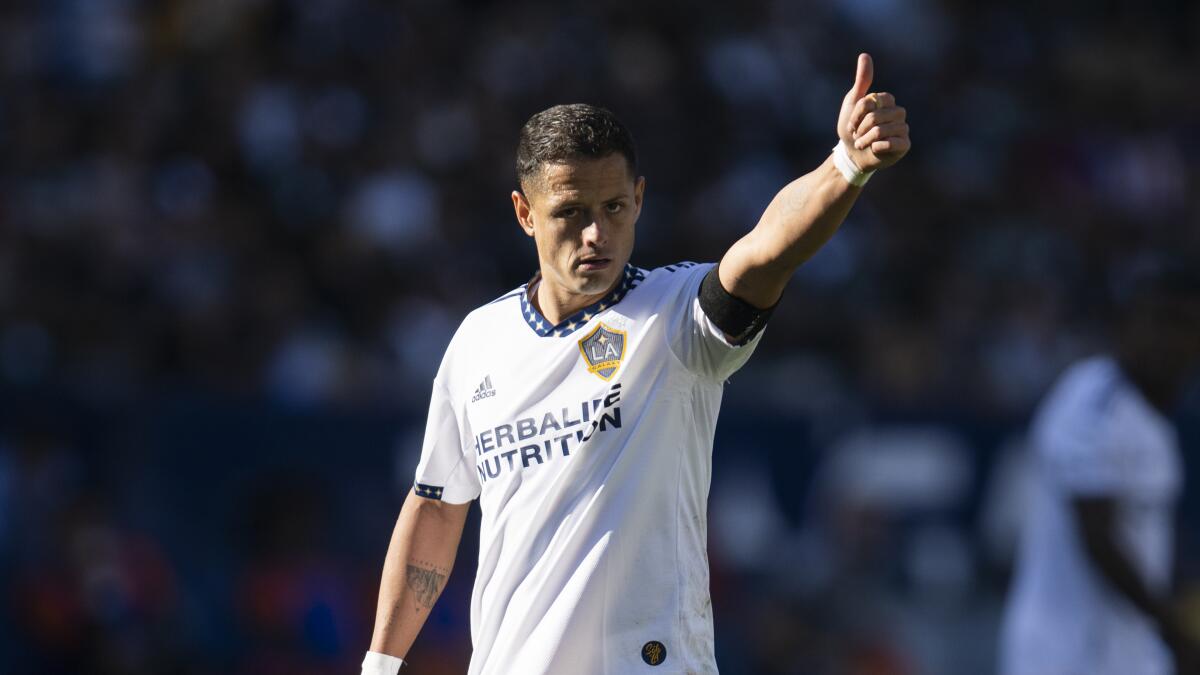
If Vela seems content biding his time, Hernández is hell-bent on a mission — which is why he cried after his goal Sunday gave the Galaxy their first win over NYCFC since 2015.
“I want to be champion,” he said. “But I need to walk a very, very difficult path to get there. I was talking with my teammates [about] last season. Yeah, it was a pretty good year for me. Yes, I scored 17 goals. But I ended the season with a bitter taste. In the end I didn’t qualify to the playoffs. I wasn’t a champion.
“I don’t care if I score 50 goals. If I don’t go to the playoffs it doesn’t mean a thing. So if we all are committed, if we all have that mindset — be professional, be committed — that’s what’s going to bring us closer, probably, to our goals that we want to achieve. That’s the beauty of this always. Redemption. Growth.”
Hernández and the Galaxy are in a much different place than Vela and LAFC. Vela, a former league MVP who still holds the single-season MLS scoring record, led his team to a Supporters’ Shield in 2019, the CONCACAF Champions League final in 2020 and the MLS playoffs in three of the last four seasons.
Calf injuries have kept Hernández out of 29 of the Galaxy’s 57 games since his arrival and the team hasn’t played for any hardware since 2014. It’s missed the postseason in four of the last five seasons, the worst drought in franchise history.
The pressure to win now is enormous.
Beyond that, Hernández has few, if any, European suitors. Moreover, if the Galaxy pick up his contract option this winter, it would leave them with no designated player slots until 2024 at the earliest. That lack of flexibility could hurt the team since this is a World Cup year, typically a busy one for transfers and signings.
If he avoids injuries, performs as he did last season, when his rate of a goal every 102 minutes was third-best in MLS, and takes the team to the playoffs, Hernández probably will be back. But if he misses on any of those three things, his future could remain uncertain.
If he’s worrying about any of that, he isn’t letting on.
“I’m just completely grateful for this organization to believe in the way that they are believing in me,” he said. “The only thing that it’s in my mind is I want to keep enjoying it.”
When it reigns, it pours: USWNT ends goal drought
So much for the scoring problems of the women’s national team.
With coach Vlatko Andonovski in the midst of a much-needed and long-overdue refreshing of his roster, the U.S. women went into the second game of the SheBelieves Cup last month having been shut out four times in their previous 13 games.
Prior to that, they hadn’t been shut out four times in five years.
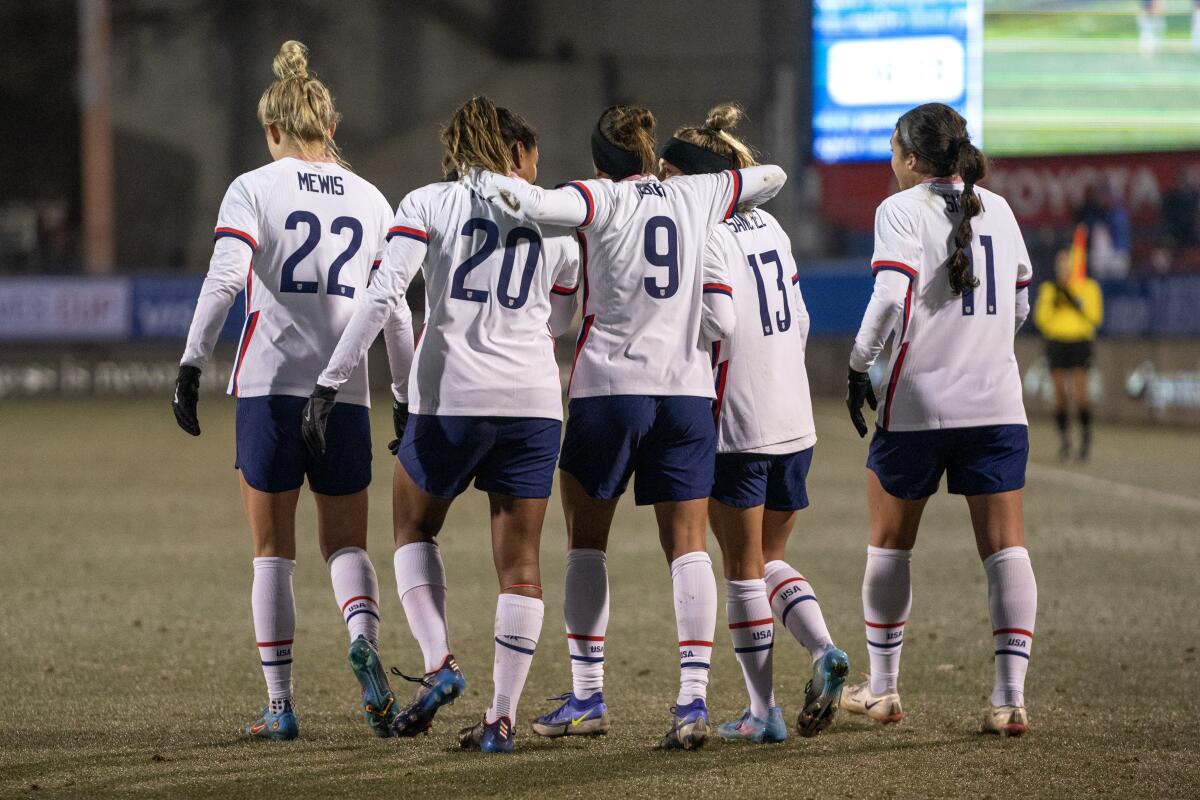
The women appeared to break out of that with a 5-0 win over New Zealand, but three of those goals came from Kiwi defender Meikayla Moore.
The drought may have ended for good in the SheBelieves final, though, with Catarina Macario and Mallory Pugh each scoring twice in a 5-0 rout of Iceland last Wednesday.
“I feel comfortable saying that we made strides,” Andonovski said. “Obviously, there’s always going to be room for improvement, especially with young players or a young group of players like this one. But I feel pretty comfortable saying that they did a pretty good job.”
The U.S. had the oldest team in last summer’s Tokyo Olympics and the elders didn’t get much respect while being held scoreless in three of their six games en route to a bronze medal.
The six forwards Andonovski used in Japan averaged 33 years of age, but the six he called up for the three-game SheBelieves Cup were a full decade younger — and that doesn’t even count the 22-year-old Macario, who is listed as a midfielder but played as a center forward.
“It wasn’t necessarily that Cat grew in the position as much as the team grew with Cat in that position,” Andonovski said.
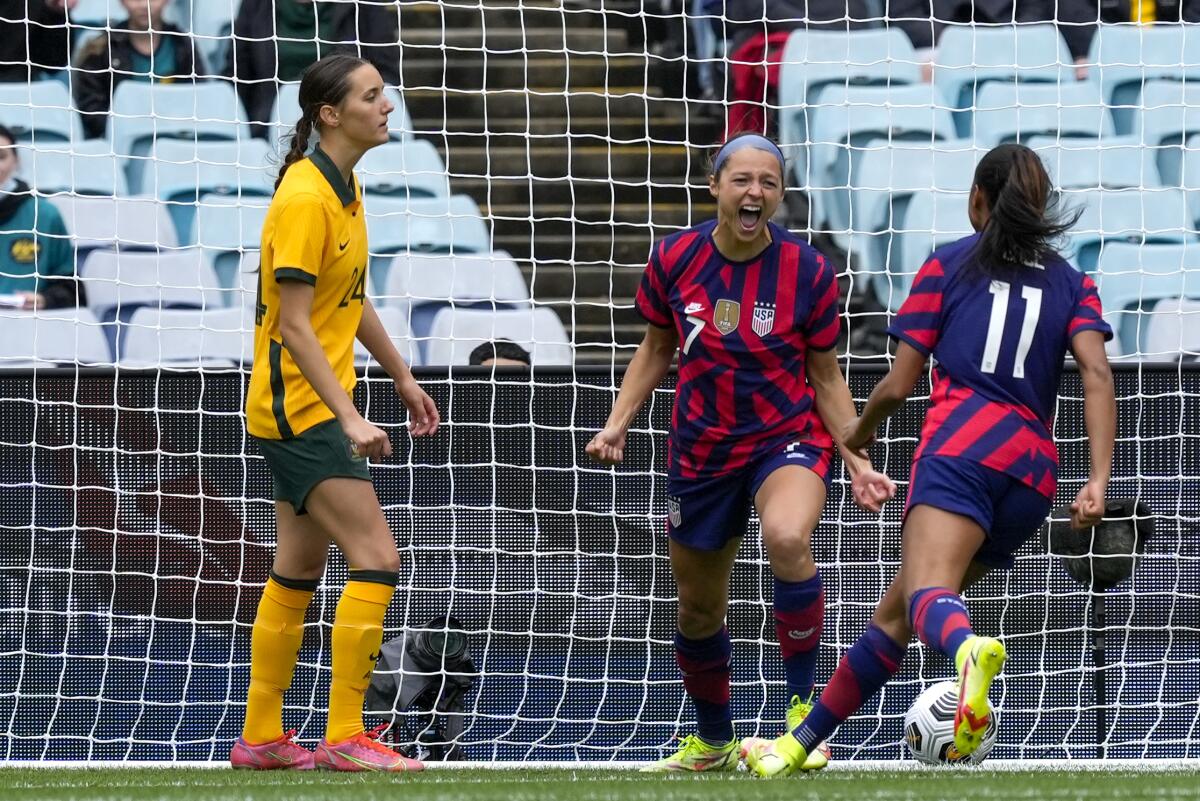
And that gives Andonovski a deep pool of talent to draw from for this summer’s CONCACAF W Championship, which will serve as the qualifier for both next year’s World Cup as well as the 2024 Paris Olympics. In addition to Macario, Pugh and Ashley Hatch, who scored three times in her last four games, the coach will be able to recall Alex Morgan, Christen Press, Tobin Heath and Megan Rapinoe, who have combined for 277 international goals and eight World Cup titles.
SheBelieves, which traditionally has drawn three other top-10 teams to challenge the No. 1 U.S., was far less competitive this year with No. 8 England, No. 6 Canada, No. 3 Germany and No. 9 Spain all playing in the Arnold Clark Cup in England. But it still provided a good test for the young Americans, who are trying to find their way.
And despite all the gnashing of teeth over the national team’s recent “slump,” the women are unbeaten in their last 65 matches at home and haven’t given up a goal at home since March 11, 2020, a span of 17 games and 1,562 minutes, the longest streak in U.S. soccer history.
And finally there’s this …
Jesse Marsch was appointed Monday as the new coach at Leeds United, making him the second American coach, after Bob Bradley, to manage a Premier League team. The former Chivas USA midfielder previously managed the New York Red Bulls, Red Bull Salzburg and Leipzig. Leeds is 16th in the EPL table, two points above the drop zone.
Podcast
Don’t miss my weekly podcast on the Corner of the Galaxy site as co-host Josh Guesman and I discuss the Galaxy each Monday. You can listen to the most recent podcast here.
Quotebook
“Seeing the suffering on their faces and fear for their country makes me realize I can’t stand still and pretend that nothing has happened.”
Wojciech Szczesny, the starting goalkeeper for Italian club Juventus and the Polish national team, and the husband of a Ukrainian wife, announcing his support for Poland’s decision to not play Russia in World Cup qualifying after viewing news coverage from Russia’s invasion of its neighbor
Until next time...
Stay tuned for future newsletters. Subscribe here, and I’ll come right to your inbox. Something else you’d like to see? Email me. Or follow me on Twitter: @kbaxter11.
Go beyond the scoreboard
Get the latest on L.A.'s teams in the daily Sports Report newsletter.
You may occasionally receive promotional content from the Los Angeles Times.




